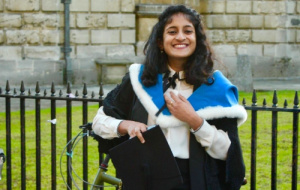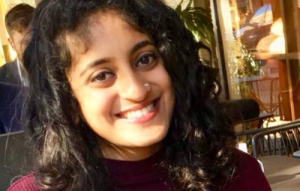Profile: Gauri Pillai

Gauri Pillai (2017, DPhil Law)
Gauri Pillai (2017, DPhil Law), Rhodes Scholar, is in the second year of her DPhil examining reproductive rights. In April last year she presented some of her doctoral work at the “Sexual and Reproductive Rights: Legal Battles and Social Movements” conference in Bangalore, India.
What led you to do a DPhil?
Well, I wandered into doing it (as I seem to do with many things in life). Though I must say, I realised during my Bachelor of Civil Law that I really enjoyed the process of thinking about a question deeply, investigating it from various angles, and constructing a nuanced argument taking into account competing perspectives. This, in my opinion, lies at the heart of enjoying your DPhil research. That, and finding an area of study you feel strongly about.
On many days, research can seem slow, as you trudge through volumes of material only to find that none of it is helpful. But of course, cliched as it may sound, it really is all a process of learning. I also find immense pleasure in arriving at a conclusion, however small. I draw strength from my peers, a group of human rights lawyers working on complex questions, challenging power and the various forms it manifests in. To me, my DPhil goes far beyond my own research. Instead, I see it as me learning from, and contributing to, a conversation on alternate ways of thinking about rights.
What have you found so far in your research?
My project aims to reimagine reproductive rights through the lens of the rights to equality and non-discrimination. On the one hand, viewing reproductive rights as an issue of women’s equality and non-discrimination appears intuitive. On the other, however, it appears to run up against what we usually understand as equality: equal treatment between people who are alike. If the requirement of likeness is central to a claim of equality, then can women—who can become pregnant—claim equality with men who cannot? Are women like men? Should they need to be like men to claim equality? Are we not then prescribing to, and failing to challenge, the male norm? My thesis tackles this apparent contradiction, and attempts to unearth within Indian constitutional law a notion of equality which helps us ask the right questions in the reproductive context.
How have you found moving to and living in Oxford?
When I moved to Oxford, for the first time I realised what it means to be a member of the minority. And it surprised me how much that shaped my life, though now, looking back, I’m surprised that I was surprised. The transition was harder than I had imagined.
I’ve now found my community in Oxford, and definitely have a sense of belonging. But, in no sense was that immediate, or easy. These experiences have made me keenly aware of how institutions are structured, and our roles and responsibilities within them to make sure that oppression and exclusion are not furthered.
What does a day in your life look like at the moment?
I am back home in India now. My family has always been my safe space, and I find being at home calming. This time has been no different. While the uncertainty of it all has been overwhelming, I’m also incredibly lucky to have such a strong support system.
I have some days where I work, and others where I’m unable to. My work days usually start with a cup of coffee (of course), and some reading or writing. I then meet three of my closest friends at Oxford on Zoom, a virtual version of the weekly “Writing Circle” we used to do at George Street Social every Friday. We work (or we try to), and we chat (that often comes more easily). Speaking to them makes me feel very connected to my life as it was before the pandemic. Every Thursday, I also attend “Research Group”, an (online) meeting of everyone being supervised by my thesis advisor. While it is primarily aimed at allowing us to present our work and receive feedback, it contributes to my sense of continuity, and reduces, at least slightly, the disruptive effect of the pandemic.
Joining the yoga bandwagon, I usually do an hour or so of yoga in the evening, followed by dinner and some down time with family. I end up reading or watching a movie/TV show before I sleep. It still surprises me that I’ve managed to develop a routine during these strange times. I suppose it speaks to both my privilege, and the adaptability of human nature.
 How did it feel to be awarded a Rhodes Scholarship?
How did it feel to be awarded a Rhodes Scholarship?
The Rhodes Scholarship is of course very well-known, and being awarded the scholarship gave me an opportunity to study at Oxford, something I would have found harder to do without it. When I was awarded the scholarship in 2017, my immediate reaction was certainly a sense of pleasure, as I saw it as an acknowledgment of the work I’d put in across the years, and a sign of the potential in my ideas. To this extent, I am grateful.
But any conversation on the Rhodes Scholarship is grossly incomplete without talking about its history, and the urgent need to decolonise. The importance of this has only been reaffirmed in recent times. It is crucial for the Scholarship Trust to think deeply about meaningful ways of responding to this history and their responsibility to do so, and for me, as a Rhodes Scholar, to contribute to these conversations. On a very personal level, I see the history of the scholarship as having strengthened my moral compass, committing me to challenging, both personally and in my work, the very systems of power on which the history rests.
What do you do for fun in your spare time in Oxford?
I love spending time with my friends. I also really like cooking for other people. Something I’ve started enjoying since my move to the UK is regular exercise. It gives me a lot of pleasure, especially as a way to end my day. Depending on my mood, I run, use the gym, or go for a walk. I read, but not as much as I’d like to.
How do you feel you have changed since you stepped through Univ’s doors for the first time?
I walked in, star-struck, by the sandstone and spires.
Then, I stumbled, searching for my place.
Now, the shine has worn off, but I feel more at home.
Published: 16 June 2020
